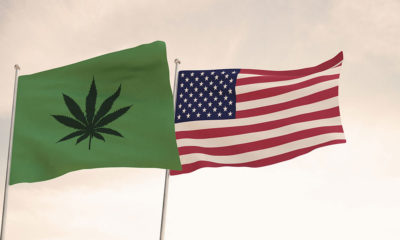
Legal
Legalization Comes to the Midwest & Women Are Leading the Charge
When it comes to drug policy reform, little attention has been paid to the conservative states of the Midwest and the South because these regions are perceived as hostile environments for medicinal and recreational use of marijuana. But, as the country grapples with issues of state versus federal power, privacy and civil liberties, many of these states are turning the tide of the drug policy debate.
In 2011, a grassroots group in Missouri that lacked the funding and confidence of other larger ballot initiatives, Show-Me Cannabis Regulation, only narrowly failed in gathering enough signatures to put full legalization on the 2012 ballot, where it likely would have passed. Fifty-four percent of Missourians favor the full legalization of marijuana and hemp farming, according to a poll conducted by DMH Research in 2012. The state’s CBD-only law passed in 2014, but Missouri failed to pass a medical marijuana bill in 2015. The state’s 2016 legislative session convened Jan. 6 and has already included the filing of a medical marijuana proposal.
Legalizing marijuana in Missouri would make a lot of fiscal sense. A study by Jeffrey A. Miron, a researcher and professor in economics at Harvard University and the Cato Institute, in conjunction with Abhi Sivasailam, a board member at Show-Me Cannabis Regulation, indicates that the state could save an estimated $90 million in enforcement costs and instead yield an additional $59 million in legal cannabis tax revenue.
Show-Me Cannabis has succeeded largely due to its well-rounded campaign team, particularly Amber Iris Langston, the 2011 Campaign Manager of Show-Me Cannabis Regulation and current deputy director.
While studying rural sociology at the University of Missouri, Langston, a Missouri native, helped spearhead two successful initiatives to legalize medical marijuana and decriminalize possession in the city of Columbia, Mo., the first laws of their kind in the state.
Langston has served as an outreach director and international liaison for Students for Sensible Drug Policy in Washington, D.C., as field support for Americans for Safe Access in Oakland, Calif., and as media liaison for California’s Proposition 19 to tax and regulate cannabis in November 2010. She returned to Missouri in 2011 to lead Show-Me Cannabis Regulation. She is also the executive director of Women Against Prohibition (WAP!), as she believes women are the last piece to ending the War on Drugs.
Cannabis Now Magazine sat down with Amber Langston to talk about reforming drug policy in Missouri and other conservative states as well as challenges faced by biology — being a woman in a man’s industry.
Why do you think the South, and conservative states in general, are going to surprise people on this topic in the next couple election cycles?
I think there is a larger political dialogue that is going on within conservative circles around the country. It has not quite teased itself out yet it. The Tea Party doesn’t know exactly who they are or how they fit in, but there has been a resurgence of awareness towards civil liberties issues and the recognition of the abuses that happen under the guise of the Drug War. That has been very powerful to people and they are starting to come around to understanding it.
One issue that has been coming up both from our support and our opposition in Missouri is the notion of home grows. This is a very contentious issue, they don’t have it in Washington and they almost didn’t get it included in the language of Colorado’s law, where now they can only grow six plants, which I personally think is too few.
Just recently we had a narcotics officer who attended a town hall we held in his hometown of Cape Girardeau who was very critical of legalization, which got him some media attention. However, when he spoke to the press he basically relented that people should be able to do what they want in their own home. That whole concept as it relates to drug policy has not really been pushed, but I think it is one of the simplest and most effective arguments we have in ending the Drug War.
With all of this talk about marijuana policy and the Drug War in conjunction with the Tea Party and the Republican Party trying to find where they fit in, we are creating a perfect storm for drug policy reform and for legalization in more conservative states.
Why would Missouri go straight for legalization in 2014 and not medical?
Our poll numbers did not show that much more support for medical marijuana than legalized marijuana, only about three to four percent more in 2011. I didn’t want to have to sit there and say, “no we don’t want to legalize marijuana” for two more years when, in fact, we do. We also can’t address those civil liberties issues the same way we can for medical, and we can’t talk about hemp, which is very important to the potential economy of Missouri and Missouri farmers. Medical is only half of it; Missouri is a no bullshit politics state, which is why we are the Show-Me State. Only talking about half of it would be a disservice. And let’s be honest, many legitimate patients still cannot get their medicine in the states which have medical marijuana policies.
How do you feel being a woman in drug policy reform negatively or positively impacts your work?
Whenever I am making introductions to people, mostly men, many times they politely talk to me for a minute but then are ready to move on to speaking to the other men that I’m with. I feel as if I can make an introduction to the conversation but I don’t always get to finish my statements.
You have been working on drug policy reform for 12 years, when you talk to people outside the movement what is their reaction? You aren’t a stereotypical stoner.
Surprise, shock. People do stop and listen to me, they don’t expect this message coming from a woman, but they are often more receptive to the message from one.
I always talk about the morality of it. When we have events you can talk about economics and civil liberties, but this is moral. The reason we have this prohibition policy right now is fear, and if we don’t address fear and the emotion behind everything we can’t get anywhere. I guess, as a woman, I am able to bring out those discussions about feelings that need to be talked about but aren’t.
Over the last year, in both cannabis and the mainstream media, there has been a lot of sensationalized coverage about women and weed that doesn’t really move the dialogue forward. The reality is there is still a huge gender gap when it comes to women voters. Convincing women voters is necessary for success at the ballot. How do women in the movement convince the men in charge to step back and let women lead?
I wish there was a good answer to that. I think the most convincing thing is the polling numbers. The female voting block needs to be addressed. I think there is an evolution of recognition of what women really can and have been doing for this movement. We talk about civil liberties a lot but we don’t talk about the rights of women specifically. What are women’s rights within this context? Bringing up other gender issues within the context of the Drug War is important, but it’s hard to do. We are fighting patriarchy within the ranks of fighting the Drug War.
We need more recognition of the strong women within our movement. There is a tendency for the pretty young things to be what is put up front. But that is not what gets the votes and that doesn’t appeal to those who are worried about their children, the next generation, those who are responsible for the continuation of our society, if you will. We need the women who are cultural gatekeepers at the front. How do we convince the men they need to step aside for that? How do you convince someone to loosen their reigns of power?
Women need to raise more money; maybe we just need to find more women willing to fund the movement because money seems to be what really talks to people. It’s the old white dudes who have the money and it’s the old white dudes who turn to the other old white dudes to get the money.
We need to empower more women who have power. It is not easy; I wish I had a better answer. In any successful campaign you need to figure out who we are targeting and represent them.
The first time I attended a NORML Conference was the first time they gave an award to a woman for activism in NORML. [National NORML Secretary] Allen St. Pierre gets up there and says, “We need to get more women involved.” This aging hippy with a staff starts pounding it on the floor and chanting “More women! More women!” The whole room erupted in this chant of “More women!” As a young woman wanting to get involved in this movement, it was rather intimidating, and not particularly empowering.
[Law Enforcement Against Prohibition Speaker] Diane Wattles-Goldstein pointed out that the reason more women are coming to the front of the movement is because there has been a sort of backing away from that over-sexualization. It’s still there, it is still a problem, but the spaces where we have allowed strong, intelligent, responsible women talk about this issue is where we have made leaps and bounds, where we have made a lot of changes.I don’t know how to convince them except to keep talking about it.
Published in issue 9 of Cannabis Now.
























